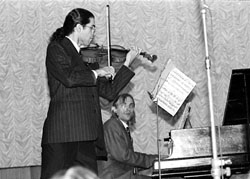GOLDEN FEVER OF MUSIC

With a touch of sadness we mark the close of the Kyiv Music Fest, on which we have written earlier. Its stylistic picture resembled a multicolored mosaic: neobaroque, neoromanticism, neoclassicism, avant-garde of the 1960s, post-avant-garde, and, finally, the search for intonation in the 1990s.
Let us start with one of the festival’s most challenging premieres. It has become a tradition for musicians to speak about Serhiy Zazhytko and his new opera magna as something extraordinary. This time the composer submitted to the judgment of audiences his Nestor Batiuk, a humorous dramatized show comprising a reciter, tambourine, violin, mandolin, toy instruments, and other sounds. The author encroached on the holiest of holies, Mikhail Lermontov’s Sail. What strikes one in the reciter’s words are his insolent, perhaps even insulting, accents of sense. Gradually, the orator’s loftiness turns into dance-like movements accompanied by catcalls from the hall’s many nooks and special sound effects. As always, Zazhytko raised a commotion with the audience: he sent some into a state of mild shock and engaged others in an active game. What’s this? The author’s desire to be the focus of attention? To be the first to reach the finishing line of the post-avant- garde? To enable one to have a new vision of the old, to sing in a modern manner the beautiful intonations of Lermontov’s lyricism? Or are we witness to the birth of new artistic and stylistic trends which challenge the ostentatious seriousness of post-modernistic challenges?
Whatever the case, the idea of literature and theater is beginning to reign supreme in modern music. Suffice it to take Douze notations (Twelve Notes), the program title of Pierre Bouleze’s piano cycle, The Creation by Valentyn Martyniuk, “a dialogue between poet and composer” (for a reciter and the piano), and Lesia Dychko’s French Frescoes, a flashy theatrical extravaganza (for a mixed choir, organ, woodwind and percussion quartet, ballet, and reciter).
Noteworthy in this connection is Leonid Hrabovsky’s composition to the words of Mykola Vorobiov, Be it Thus, for a soprano and three electronic instruments. The composer created a miniature philosophical treatise, where the performers themselves are narrators who imitate the sounds of real-life phenomena, such as the humming of an airplane, the ringing of an alarm clock, the ambulance siren, and computer-synthesized language. These imitations that crown each of the cycle’s eight poems sound as signals of the presentiment of disaster, woe, and human suffering. Such play with the sounds of civilization has put Hrabovsky’s composition on a par with the emotional and painfully expressive Sartrean works: the same existential outpours at the brink of the surrealist conscious and subconscious.
What seemed to contrast the festival’s expressive subject line were the constructive sound experiments of Yuri Laniuk, Sviatoslav Luniov, Ivan Nebesny, and Hennady Liashenko. These authors’ works are united with the same dramatic technique: every instrument is a character in the theatrical extravaganza, and the purpose of each is but a tribute to the avant- garde tradition. The violin, after squeezing out a few tense signature tunes, turns to lengthy dissonant passages; the flute assumes the task of launching various froulades, while the piano chimes and breaks into a mordent, sometimes pronouncing a verbal thesis or joining the play dialogue by means of pizzicato, percussion, or vibrantly resonant special effects.
Other figurative artistic trends were marked in neoimpressionist compositions. The effects of sound generation and the experiments of timbre and pitch were this time aimed at creating the colorful images of the almost visible compositions (Aural Illusions by Liudmyla Yurina, House of Cards by Dmytro Kapyrin, and the piano cycle Colored Spring by Hennady Sasko).
Also presented at the festival were The Messenger and The Epitaph, meditative works by Valentyn Sylvestrov, as well as works of the new-generation composers Hanna Havrylets and Volodymyr Runchak, Somebody Else Is with Me, written by he latter for the piano trio, called up, at least in me, associations with the philosophic and meditative pictures of renowned Ukrainian artist Ivan Marchuk.
As to Valentyn Sylvestrov, he presented a not-so-customary facet of his artistic profile. Autumnal Serenade for the string orchestra baffled many of those present. The four-part cycle Tango, Song, Intermezzo, Lullaby intrigued the listeners with the way the author concretely implemented the programmed genre principles.
As you see, the fest cut across several lines of genre and meaning. One of the most pronounced lines was that of tragic images: A Plaintive Mass by Vincenzo Manfredini (Italy), Sylvestrov’s Epitaph, a series of Yevhen Stankovych’s passacaglias (one for the organ and two for a chamber ensemble), and the festival’s final word, Liebestod by Vitaly Hubarenko, and Symphony No.6, Tragic, by Gustav Mahler. Can it possibly be a mere coincidence of circumstances or is it the expression of the intuitive feelings of people at the turn of the millennium?
The festival has ended. Its success depended to a large extent on the broad variety of performing interpretations. Special kudos should go to the National Meritorious Academic Symphonic Orchestra of Ukraine conducted by Volodymyr Sirenko and Kyrylo Karabyts, the Meritorious Symphonic Orchestra of the National Radio Company of Ukraine conducted by Vyacheslav Blinov, the National Ensemble of Kyiv Camerata Ukrainian Soloists conducted by Valery Matiukhin, the Kyiv Chamber Orchestra conducted by Roman Kaufman, the Cluster Ensemble of New Music conducted by Andriy Yurkevych of Lviv, the Kyiv Municipal Chamber Choir, the Khreshchatyk Municipal Chamber Choir, the Vesnivka Children’s Choir, and others.
Closing the fest, its director Ivan Karabyts noted the ambivalence with which some journalists greeted it. Come what may, it was clear from his words that the festival might have brought forth both joy and dispute but never left anyone indifferent.
P. S. A mistake was made in the previous issue for technical reasons. The 1998 festival naturally honored the sixtieth, not seventieth, birthday of Myroslav Skoryk.






